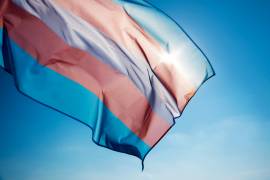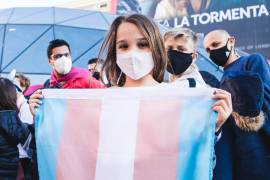
Of Counsel: Ending the School-to-Prison Pipeline
Blog Search
The arc of the moral universe may bend towards justice, but it doesn't bend on its own. To secure the gains this country has made requires constant vigilance, not complacency. Whether it's by challenging those who erect new barriers to the vote or ensuring that the scales of justice work equally for all in the criminal justice system and not simply a pipeline from underfunded schools to overcrowded jails... it requires vigilance. —President Barack Obama, August 28, 2013
The words rang out over the thousands of us assembled last month before the Lincoln Memorial to commemorate the 50th anniversary of the March on Washington and the Rev. Martin Luther King Jr.’s “I Have a Dream” speech. Lambda Legal had been provided one “gold ticket” from the White House, and rain or shine (the weather did both that day), I was honored to represent us. Now, the President himself had called out a deeply damaging dynamic we are working to address: the so-called “school-to-prison pipeline.” I practically shouted out to answer from my seat.
As the oldest and largest national legal organization committed to achieving full recognition of the civil rights of LGBT people and people with HIV, Lambda Legal has focused for years on young peoples’ rights both in public schools and in state custody.
From our precedent-setting 1996 federal appellate court decision in Nabozny v. Podlesny spelling out the constitutional obligation of public schools everywhere to protect students from antigay abuse, to our recent settlement with an upstate New York school district, our docket has included numerous cases on behalf of lesbian, gay, bisexual, transgender or questioning (LGBTQ) youth in schools and their allies. We are committed to helping schools become welcoming environments for all students, including those who are LGBTQ and gender-nonconforming. And in the course of our wide-ranging advocacy on behalf of our young clients, Lambda Legal’s work concerning youth who are rejected from their homes informs us that LGBT students unsupported in schools and at home are at immense risk for juvenile detention and, later, incarceration.
Lambda Legal has engaged with students, educators and community members in convenings strategizing to dismantle the school-to-prison pipeline. We have participated for two years in the Southern regional conference “South Star: Safe Schools Convening of the South,” where more than 40 organizations collaborate on workshops and strategy sessions to address anti-LGBT bullying and harsh disciplinary policies that drive students from schools, rather than make them safer and more supportive. We also submitted testimony to the Senate Judiciary Subcommittee on the Constitution, Civil Rights and Human Rights when it held hearings a few months ago on how to end the pipeline, explaining the negative impact of school disciplinary actions that push students out of schools and into juvenile justice systems. These actions ravage some of the most marginalized and victimized students in schools: they are documented to adversely affect youth of color and those who are or who are perceived to be LGBTQ.
A review of calls to the Lambda Legal Help Desk shows that in recent years Lambda Legal has received more than 50 reports of students having been unfairly punished, including students expelled because of their sexual orientation or gender expression; school officials pressuring parents to homeschool a child because of the student’s or parent's sexual orientation or gender identity; and children uprooted and sent to alternative schools simply because school officials were uncomfortable with their identity. Practically all students on whose behalf we advocate and litigate have had some experience with the domino-effect that feeds the pipeline. Here are a few of our advocacy points aimed at disrupting the harm:
LGBT students face harsher punishments for similar infractions than their heterosexual counterparts.
Research has finally emerged showing what LGBT advocates who work with youth have long known: LGB teens and young adults are more often punished by school and criminal authorities than are straight youth. Data from a nationally representative sample of more than 15,000 people interviewed both as teens in grades 7 through 12 and again when they were 18 to 26 years old show that LGB adolescents are about 40 percent more likely than other teens to be punished by school authorities, police and the courts. And the research demonstrates that these disparities in punishments are not explained by differences in the rates of misbehavior. In fact, a study showed that adolescents who identified themselves as LGB actually engaged in less violence than their peers. For LGBT students of color, the risk of facing disproportionate punishment is compounded.
Unchecked anti-LGBT bullying and harassment in school can lead LGBT students and students perceived to be LGBT to take matters into their own hands, resulting in higher rates of school violence, discipline and incarceration.
A 2011 Gay, Lesbian & Straight Education Network (GLSEN) study found that 63.5 percent of LGBT students felt unsafe in their school because of their sexual orientation. Unsurprisingly, one out of every three LGBT students reports skipping school based on safety concerns, rendering them truant and pushing them closer to suspension and expulsion. In addition, the study notes, “victims of such harassment and abuse may turn to physically defending themselves against bullies, carrying weapons, and other survival tactics that endanger the school community.” Common sense leads to the sad conclusion that unchecked harassment (84.5 percent of LGBT students in a 2011 survey reported that when anti-LGBT remarks were made, faculty or staff intervened “never” or only “some of the time”) triggers increased fights with other youth. Because “zero-tolerance” policies for such conflicts, generally disregard the circumstances leading to an altercation, the result is push-out discipline for the victim ensnared in the fighting. This result is especially likely where schools routinely refuse to protect the target from continued anti-LGBT harassment.
LGBT students who do not feel safe at school are more likely to be truant, to drop out, and to engage in other risky behaviors such as substance abuse and sexual exploitation.
Schools should provide a safe environment for all students; unfortunately, many schools fail to protect their LGBT students. The Centers for Disease Control and Prevention acknowledges the adverse health effects of an unsafe school environment, noting that “[n]egative attitudes toward gays, lesbians, bisexuals, and transgender people put LGBT youth at increased risk for experiences with violence, compared with other students.” The CDC notes that these stresses experienced by LGBT youth put them at greater risk for mental health problems, substance use, and physical health problems. The cycle of harassment, violence, and discipline leads to students being pushed out or dropping out of school. Given the tragic reality that many LGBT students are not welcome in their families, many of these LGBT youth end up on the streets. Indeed, 20 to 40 percent of homeless youth identify as LGBT. Once homeless, LGBT youth are at higher risk for victimization (LGBT youth are roughly 7.4 times more likely to experience acts of sexual violence than heterosexual homeless youth), mental health problems and unsafe sexual practices.
Throughout this work, we keep in mind that students are a fairly transient population, and unhealthy school environments tend to fester and infect more widely if unaddressed. We link our advocacy and education with our litigation, because remedies after the fact only approximate justice for students deprived of their educational rights. The facts are intolerable, the cost astronomical. That’s why Lambda Legal is actively engaged in work to end the school-to-prison pipeline.



